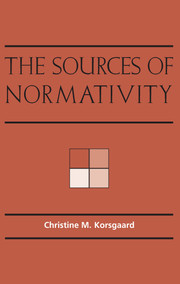Book contents
- Frontmatter
- Contents
- Notes on the contributors
- Acknowledgments
- Introduction
- Prologue: Excellence and obligation a very concise history of western metaphysics 387 bc to 1887 ad
- 1 The normative question
- 2 Reflective endorsement
- 3 The authority of reflection
- 4 The origin of value and the scope of obligation
- 5 Reason, humanity, and the moral law
- 6 Morality and identity
- 7 Universality and the reflective self
- 8 History, morality, and the test of reflection
- 9 Reply
- Bibliography
- Index
7 - Universality and the reflective self
Published online by Cambridge University Press: 20 May 2010
- Frontmatter
- Contents
- Notes on the contributors
- Acknowledgments
- Introduction
- Prologue: Excellence and obligation a very concise history of western metaphysics 387 bc to 1887 ad
- 1 The normative question
- 2 Reflective endorsement
- 3 The authority of reflection
- 4 The origin of value and the scope of obligation
- 5 Reason, humanity, and the moral law
- 6 Morality and identity
- 7 Universality and the reflective self
- 8 History, morality, and the test of reflection
- 9 Reply
- Bibliography
- Index
Summary
Christine Korsgaard has provided us with an illuminating analysis of the problem of the normativity of ethics. She observes that it is the reflective character of human consciousness that gives us the problem of the normative — the fact that unlike other animals, we can fix our attention on ourselves and become aware of our intentions, desires, beliefs, and attitudes, and of how they were formed. But it is not awareness alone that does it; a further aspect of our reflective consciousness is involved, which can appropriately be called freedom. Here is what she says:
Our capacity to turn our attention on to our own mental activities is also a capacity to distance ourselves from them, and to call them into question … Shall I believe? Is this perception really a reason to believe? … Shall I act? Is this desire really a reason to act?
(3.2.1)The new data provided by reflection always face us, in other words, with a new decision.
The normative problem does not arise with regard to everything we observe about ourselves: we cannot decide whether or not to be mortal, for example (though we may have to decide how to feel about it). It is only beliefs, and acts, or intentions that face us with the problem of choice, and it is in our response to this problem that values and reasons reveal themselves.
- Type
- Chapter
- Information
- The Sources of Normativity , pp. 200 - 209Publisher: Cambridge University PressPrint publication year: 1996
- 13
- Cited by



